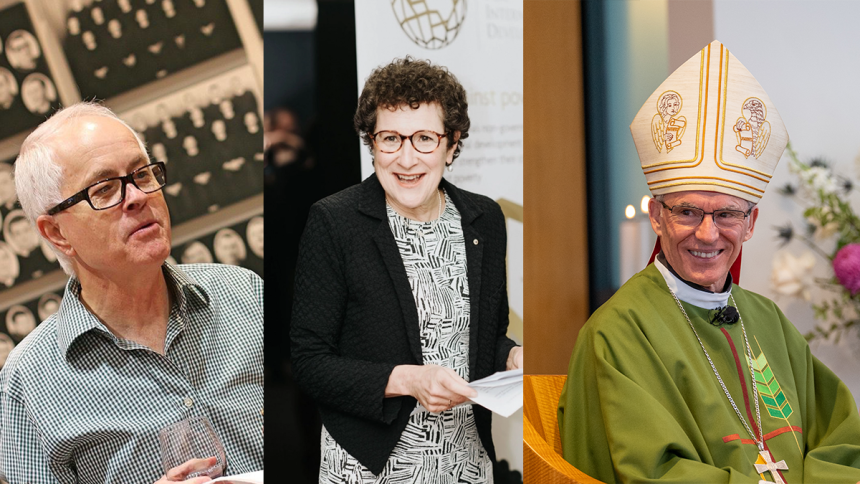
Fr Ormond Rush (Left) and Susan Pascoe (Middle), who were last year named to serve on commissions supporting the Synod’s work, has also been invited to help prepare what is known as the Document for the Continental Stage. Photo: Facebook & ACFID. Australian Catholic Bishops Conference President and Perth Archbishop Timothy Costelloe SDB, who served as President of the Plenary Council, was also named to the working group. Photo: Michelle Tan.
The journey of the Fifth Plenary Council of Australia is seen as a key reason three Australians are part of a group of about 20 people from around the world preparing a key document for the global Synod on Synodality.
More than 100 bishops conferences, including the Australian Catholic Bishops Conference, last month published national or regional syntheses following a months-long period of local consultation in preparation for the XVI Ordinary General Assembly of the Synod of Bishops.
The process will culminate in a meeting in October 2023 with the theme “For a Synodal Church: Communion, Participation, Mission.”
Susan Pascoe and Fr Ormond Rush, who were last year named to serve on commissions supporting the Synod’s work, have also been invited to help prepare what is known as the Document for the Continental Stage.
That document will support ongoing prayer, reflection and discernment in the lead-up to next year’s meeting.
Bishops Conference President Archbishop Timothy Costelloe SDB, who also served as President of the Plenary Council, was also named to the working group.
Ms Pascoe, who is a member of the Synod’s commission on methodology, said people around the world have been watching Australia’s adoption of a synodal approach, especially through the Plenary Council.
“We have been ahead of the pack, given that the process of spiritual conversation used for much of the Plenary Council is similar to that proposed for the discernment on the Synod in both the first stage in the local churches and for the continental stage,” she said.
“In addition, there has been reflection associated with the conduct of a Plenary Council here in Australia well before it was formally begun.”
Archbishop Costelloe agreed that Australia had something of a “head start”, with the Plenary Council having invited the People of God to consider significant questions around the Synod’s themes of communion, participation and mission.
“The model of a Church that listens carefully to everyone has – frankly – not been one that has been present everywhere,” he said.
“Through the Plenary Council we took that step and had the opportunity to listen to what more than 220,000 people shared with us.
“The Synod of Bishops invited similar listening and dialogue in every diocese around the world, so I think there has been a recognition that the Australian experience could benefit this global process.”
Fr Rush, an expert on Church councils and synods, serves on the Synod’s theological commission. He said working with a range of theologians from across the world has given him a keen sense of the global nature of the Church.
“It is this kind of diversity that the notion of synodality seeks to protect and nurture,” he explained.
“The members of the theological commission are all agreed on one thing: with his notion of synodality, Pope Francis is simply wanting to embed the vision of the Second Vatican Council more deeply into the life of the Catholic Church.”
Fr Rush, along with Ms Pascoe and Archbishop Costelloe, will read a number of national syntheses and work with colleagues to prepare the Document for the Continental Stage.
He says he has a “sense of excitement” as he prepares to undertake the task.
“I am having to read the national syntheses of other nations in a prayerful way, hearing their people’s experience of living the faith within their culture and their history as a local church,” Fr Rush said.
“That is a humbling, learning experience.”
Ms Pascoe said the intensive work the group will carry out will be “a prayerful and spiritual exercise”.
“It is a great responsibility to faithfully synthesise the contributions from people around the world who have themselves engaged in a listening and discernment exercise to perceive the word of the Holy Spirit,” she said.
“My hopes for the process are that we are able to reliably and authentically synthesise the concerns, hopes and dreams of the People of God, who have contributed to the first stage of the synodal journey.”
Archbishop Costelloe was part of the writing group that prepared the instrumentum laboris, or working document, for the Plenary Council. He said much like that project, the work of preparing the document for the next phase of the Synod of Bishops will be surrounded in prayer.
“Every stage of any journey of discernment must begin and end with prayer, and be infused with prayer throughout,” he said.
“Those of us called to this work will carry out our tasks under the influence and guidance of the Holy Spirit, seeking to faithfully capture the voice of the people and the voice of God through this international exercise of walking together.”
In this part of the world, the Federation of Catholic Bishops Conferences of Oceania – which takes in Australia, New Zealand, Papua New Guinea, Solomon Islands and the islands of the Pacific – will oversee the process of continental engagement.
